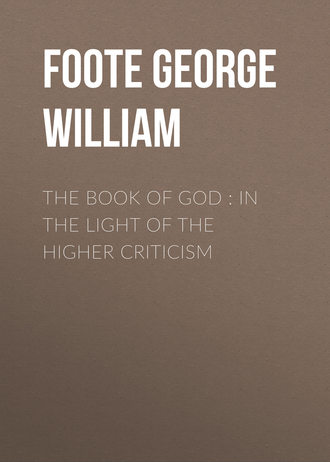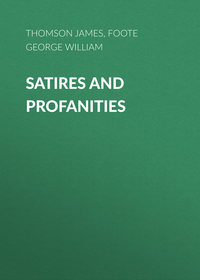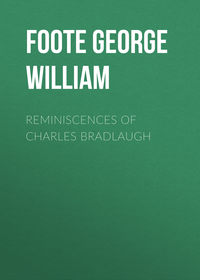
The Book of God : In the Light of the Higher Criticism
But let it not be imagined that all the guilt of persecution rested upon the Church of Rome. Protestantism persecuted as freely as the Papacy. That heretics should be put down, and if necessary killed, was a principle common to both Churches. The question in dispute was, Which were the heretics? This is so incontestable that we need not fortify it with Protestant quotations and Protestant examples. It is not true, as Dr. Farrar alleges, that Luther "boldly proclaimed that thoughts are toll-free," if it is meant that he condemned persecution. Thoughts were toll-free against Romish exactions; that was what Luther meant. He held as strongly as any Papist that those who denied one essential doctrine of Christianity should be punished by the magistrates. He declared that reason always led to unbelief. He besought the Protestant princes to uphold "the faith" by every means in their power. And when the serfs rebelled, thinking that the "freedom" the Reformers talked about was to become a reality, it was Luther who wrote against them with unsurpassable ferocity, and advised that they should be "slaughtered like mad dogs."
Dr. Farrar rather judiciously refrains from mentioning Calvin in this connection, but in another part of the volume he refers to the great Genevian "reformer" in a somewhat gingerly manner. When the sins of Catholics have to be condemned he is quite dithyrambic; but when he has to censure the sins of Protestants he displays a most touching tenderness. Nothing could well be worse than the mixture of religious bigotry, personal spleen, and low duplicity, with which Calvin hunted Servetus to his fiery doom. Dr. Farrar sympathetically describes this vile act as an "error." He tries to satisfy his conscience, afterwards, by confessing that the Calvinists in general "were for the most part as severe to all who differed from them as they imagined God to be severe to the greater part of the human race."
Dr. Farrar's treatment of this subject is superficial. It is not a Bible text here or there which is the real basis of persecution. We advise him to read George Eliot's review of Lecky's History of Rationalism. He will then see that persecution is founded upon the fatal doctrine of salvation by faith. This doctrine makes the heretic more noxious than a serpent. A serpent poisons the body, a heretic poisons the soul. If it be true that his teaching may draw souls to hell, human welfare demands his extermination. Dr. Farrar does not disclaim this doctrine, and if he fails to act upon it he only betrays an amiable inconsistency. His heart is better than his head.
Dr. Farrar, like other Protestants, talks about the right of private judgment. But this is only fine and futile verbiage, unless he admits the sinlessness of intellectual error. If judgment depends on the will, it is through the will amenable to motives; consequently, the way to pro-mote correct opinions is to promise rewards and threaten punishments. But if judgment does not depend on the will; if it is necessarily determined by the laws of reason and evidence; then it is an absurdity to bribe and intimidate. Now there is no third alternative. One of these two theories must be right, and the other must be wrong. Dr. Farrar is logically bound to take his choice. If he believes that judgment depends on the will, he has no right to denounce persecution. If he believes that judgment does not depend on the will, he has no right to censure the most absolute freethought.
There are but two camps – the camp of Faith and the camp of Reason. Dr. Farrar belongs to the former. But he does not find his position comfortable. He casts a longing eye on the other camp. He wants to be in both. He therefore tries to form an alliance between them, if not to amalgamate them under one banner.
Reason, said Bishop Butler, is the only faculty wherewith we can judge of anything, even of revelation itself. Dr. Farrar quotes this statement with approval. He quotes similar sentences from other Protestant writers. Then he turns upon the Roman Church for keeping the Bible out of the hands of the people, and denounces it for this with ultra-Protestant vigor. He imagines that this is a vindication of Protestantism, at any rate relatively, as a champion of reason in opposition to blind faith and absolute authority. But private judgment and free judgment are not identical. When the Protestant puts an open Bible into your hands, and tells you to read it and judge of it for yourself, he is acting like a Freethinker; but when he proceeds to say that if you do not find it to be a divine book, and believe all its teaching about God, and Jesus Christ, and the Holy Ghost, and heaven and hell, you will infallibly be damned, he is acting like a Papist. His right of private judgment, at the finish, always means the right to differ from him on trivial points, and the duty of agreeing with him on every point which he chooses to regard as essential. If this is denied by Dr. Farrar, let him honestly answer this question – Is a Freethinker who has examined the Bible, and rejected it as a divine revelation, liable to any sort of penalty for his disbelief? The answer to this question will decide whether Dr. Farrar is really maintaining the rights of reason, or is merely maintaining the Protestant theory of faith against that of the Catholics, and standing up for the authority of the Book instead of the authority of the Church.
Meanwhile we venture to suggest that the Bible texts referred to by Dr. Farrar, as requiring us to exercise the right of private judgment, are very little to the point. "The spirit of man is the candle of the Lord" is a pretty text, but it does not seem to have much bearing on the issue. "Try the spirits" is all right in its way; but what if you find that all the spirits are illusions? "Prove all things" is good, but it must be taken with the context. Jesus indeed is reported to have said, "Why even of yourselves judge ye not what is right?" But he is also reported to have said, "He that believeth and is baptised shall be saved, and he that believeth not shall be damned."
By a judicious selection of texts you can prove anything from the Bible, and disprove anything – as Catholics have often reminded Protestants. To pick out passages that to some extent are favorable to a certain view, and to ignore much stronger passages that are clearly opposed to it, may be an exercise of private judgment, and may satisfy the conscience of neo-Protestants of the school of Dr. Farrar; but it invites a contemptuous smile from Freethinkers who believe that Reason ought not to suffer such a prostitution.
We have to point out, finally, that Protestantism, with its open Bible, has everywhere maintained laws against blasphemy and heresy. The laws against heresy have fallen into desuetude in England, but while they lasted they were simply ferocious. We heard the late Lord Coleridge say from his seat in the Court of Queen's Bench, as Lord Chief Justice, that the Protestant laws against Roman Catholics, particularly in Ireland, where they were executed with remorseless ferocity, are without a parallel in the history of the world. Catholicism, however, is no longer under a ban. Even the Jews have been admitted to equal rights with their fellow citizens. But laws still remain in existence, and are occasionally put into operation, against "blasphemers." According to the language of common law indictments, it is a crime to bring the Holy Scripture or the Christian Religion into disbelief and contempt. It is true that many Christians are ready to profess a certain aversion to such laws, but they make no effort to repeal them. Many others contend that "blasphemy" is a question of manner, that the feelings of Christians should be protected, and that while men should not be punished for being Freethinkers, they should be punished for wounding orthodox susceptibilities. It is not proposed, however, that any limitations of taste or temper should be imposed upon Christian controversialists; and this contention may therefore be regarded as a subterfuge of bigotry. On the whole, it may be said that Catholics without the Bible, and Protestants with the Bible, persecute unbelief to the full extent of their opportunities; and it is only as toleration grows from other roots, and is nourished by other causes, that the Bibliolaters find out subtle interpretations of simple texts in favor of the prevailing tendency.
VI. MORALS AND MANNERS
Dr. Farrar takes the position that "the Bible is not homogeneous in its morality." There is a higher and a lower; and, to adopt the fine but paradoxical metaphor of Milton, within the lowest deep a lower deep still opens its dreadful abyss of crime and brutality. The same admission is made by Professor Bruce,5 of the Free Church of Scotland; but this gentleman is more subtle than Dr. Farrar, and tries to save the reputation of the Bible by a notable piece of cauistical special-pleading. He does not allow, though he does not expressly deny, that the Bible contains any immorality. What he does is to draw a distinction between high morality and low morality. Immorality is sinning against your conscience. High morality is acting right up to its noblest dictates. Low morality is conduct in honest conformity to the low standard of a conscience but half-enlightened. When the prophetess Deborah sings triumphantly over the infamous exploit of Jael, who invited the fugitive Sisera into her tent, and assassinated him while he slept in the confidence of her hospitality, we must not say that either of these precious females was guilty of immorality. They were simply carrying out a low morality. And the same applies to Deborah's exclamation: "To every man a damsel or two" – meaning that the Jewish soldiers slew their male enemies and dragged home a brace of maidens each for themselves. Such conduct would be highly improper now, but it was all right then; at least it was as right as they knew; and we must not judge the actors by later ethical standards. So says Professor Bruce, and it would be true enough if the Bible were not put forward as a divine book, or if it ever reprehended the infamies of God's chosen people. But it does nothing of the kind; it mentions Jael and Deborah in terms of absolute approval.
Dr. Farrar severely denounces the Jewish wars of extermination in Palestine, regardless of the fact – which is as true as any other religious fact in the Bible – that these atrocities were expressly commanded by Jehovah. Divines have defended the massacre of the Midianites, for instance, and the appropriation of their unmarried women; but Dr. Farrar calls their arguments "miserable pleas," and adds that if such "guilty and horrible" doings were "recorded without blame," it only shows that "the moral views of the desert tribes on such subjects were in this respect very rudimentary." These desert tribes were the chosen people of God; their prophets spoke under divine inspiration; yet even Jeremiah, in denouncing Moab, cries: "Cursed be he that keepeth back his sword from blood." According to Dr. Farrar, this proves how "slow" was the "development of the religious consciousness of mankind." But how did it happen that the Jews, with all the advantage of special inspiration, were just as slow in this respect as any other nation in the world's history? What is the use of "inspiration" if it does not appreciably quicken the natural development of the human conscience?
Many of the Bible heroes are fit for a distinguished place in the Newgate Calendar. Dr. Farrar himself cannot stomach "some details" in the lives of Abraham, Jacob, Jephthah, and David. Still, he urges that "the use made of them in the sceptical propaganda is often illegitimate." These worthies were not "faultless." It is their "general faithfulness" which is "rightly held up to admiration as our example." Faithfulness to what? Simply to their own greed and ambition, first of all, and secondly to the dominance of their tribal god Jehovah, who by such instruments triumphed over his rival dieties, and became at last the sole Lord God of Israel.
Dr. Farrar allows no palliating plea for the cursing Psalms. He cites a few of the very worst passages, black with hatred and red with blood, and asks: "Can the casuistry be anything but gross which would palm off such passages as the very utterance of God?" Moses was "a great lawgiver and a great prophet," but Dr. Farrar will not "defend the divinity of passages so morally indefensible" as that, for instance, which gives the slave-owner impunity in killing his slave, provided he does not slay him on the spot, but beats him so that he dies "in a day or two." Nor is there "divinity" in the order to the Jews to refrain from eating bad meat, but to sell it to the Gentiles. Neither is there "divinity" in the order (Deut. xxi. 10-14) to take a wife for a month on trial. These things are parts of an ostensibly divine code, but lawgivers and people were alike mistaken. Inspiration did not guide them aright, but somehow or other it enables Dr. Farrar to correct their blunders three thousand years afterwards; which is merely saying, after all, that inspiration does not pioneer but follow the march of human progress.
During the reign of David a dreadful incident occurred. There had been a three years' famine, and David "inquired of the Lord." The answer was, "Blood upon Saul and upon his house!" Seven of Saul's sons were hung up "unto the Lord," and the famine was stopped. Dr. Farrar tells of an intelligent artisan who got up at a meeting and asked "whether it was not meant to imply that God was pacified by the blood of innocent human victims?" But he does not give the answer; and it either means this or it means nothing at all. In the same way, the story of Jephthah, who offered his daughter as a burnt-offering to the Lord, takes such an immolation for granted as a religious act of perfect propriety. Jephthah is mentioned as a hero of faith in the New Testament, and no hint is given that he acted wrongly in sacrificing his daughter on the altar of Jehovah.
We have said enough on this subject to give the reader a fair idea of Dr. Farrar's position. Let us now pass from Bible morals to Bible manners.
"The Bible," says Dr. Farrar, "is assailed on the ground that it contains coarse and unedifying stories." Take the story of Lot and his daughters, to say nothing of the bestial attempt on the angels in Sodom. Could anything be more repulsive? Is there any excuse for putting such abominable feculence into the hands of children? After a lot of talk about it, and about, Dr. Farrar offers us the following most sapient observation: "The story of Lot wears a very different complexion if we regard it as an exhibition of unknown traditions about the connection between the Israelites and the tribes of Moab and Ammon." But what does this mean? The Moabites and Ammonites, according to the Bible, were hereditary enemies of the Jews, and it was impossible to exterminate them. They were evidently near of kin to the chosen people. Now, if these two facts are put together, it is easy to see the purpose of this story of Lot and his daughters. The Jews traced their own descent, in a perfectly honorable way, from Abraham and his legitimate wife Sarah, who are doubtless legendary characters. On the other hand, they traced the descent of the Moabites and Ammonites, their cousins and enemies, through the no less legendary Lot and his two daughters, thus throwing the aspersion of incest upon the cradle of both those races. This is the adequate and satisfactory explanation of the story. It is an exhibition of dirty and unscrupulous hatred; and, as such, it is a curious fragment of "the Word of God."
Take next what Dr. Farrar calls "the pathetic story of Hosea," the prophet who was ordered by God to marry a prostitute – not to use the more downright language of the English Bible. Dr. Farrar suggests that there is some doubt as to the meaning of the original. Hosea's wife may have turned out a baggage after the nuptials, instead of being one before. "It was the anguish caused by her infidelity," he says, "that first woke Hosea to the sense of Israel's infidelity to Jehovah." And read in the light of this "modern criticism" the story of Hosea is "in the highest degree pure and noble." How pretty! All that remains for Dr. Farrar to do is to explain away as equally "pure and noble" the imagery of Ezekiel in reference to Aholah and Aholibah. There is no reason why "modern criticism" in the hands of gentlemen like Dr. Farrar should not transform Priapus into a Sunday-school teacher.
Not only are there very gross stories in the Bible, many of which are too beastly to dwell upon, but its language is often gratuitously disgusting. And every scholar knows that the Hebrew text is sometimes far more "purple" than our English version. Dr. Farrar admits that if the "exact meaning" of certain passages were understood, they "could not be read without a blush." "Happily," he says, they are "disguised by the euphemisms of translations." That is to say, the inspired Bible writers, or penmen of the Holy Ghost, as old divines called them, were often indecent and sometimes positively obscene. Dr. Farrar's explanation is, that "ancient and Eastern readers" were not easily shocked, and that our modern "sensibility" is of "recent growth." But this proves again that "inspiration" is in no sense the cause of progress, and does not anticipate it in the slightest degree.
VII. POLITICAL AND SOCIAL PROGRESS
"The Bible," Dr. Farrar says, "is inextricably mingled with all that is greatest in human history." This is a fair specimen of his roystering style. We presume he has contracted it through long years of preaching from the coward's castle of the pulpit, where a man can exaggerate as much as he pleases without the slightest fear of contradiction. Dr. Farrar does not say that the Bible is mixed up with much of the greatest in human history; no, it must be mixed up with all the greatest – which is a transparent falsehood and a no less transparent absurdity. What did Greece and Rome owe to the Bible? Absolutely nothing. There is no evidence that they were acquainted with any part of the Old Testament, and Greece had become a mere name before a line of the New Testament was written. Some of the greatest things in the world were done and said by the "heathen." Greek philosophy, Greek literature, Greek art, are imperishable. Roman jurisprudence and Roman government are the basis of every civilised polity. Plutarch's heroes are all Pagans, and let Dr. Farrar match them if he can in the history of Christendom.
Dr. Farrar calls the Bible "the statesman's manual," but he judiciously refrains from showing that statesmen ever act upon its teaching; indeed, he spends a great deal of time in showing that they ought not to act upon its teaching, unless they carefully avoid the obvious "letter," and allow themselves to be influenced by the recondite "spirit." For instance, it is perfectly clear that the Bible does not contain a single word against slavery; it is also perfectly clear to all who possess a tincture of scholarship that many of its references to slavery are fraudulently translated. "Servants obey your masters" really means "Slaves obey your owners." Moreover, the Bible contains precise regulations of slavery. God did not tell the Jews that holding slaves was infamous, that man could never have honest property in human flesh and blood. He allowed them to buy and sell Gentiles at their pleasure. He permitted them to enslave their own countrymen for a period of seven years, and in certain cases "for ever." Even in the New Testament we find St Paul sending back a runaway slave to his master. True, he sent with the slave a touching letter to the slave-owner, but sending him back at all was giving a sanction to the institution. Dr. Farrar admits that American pulpits "rang with incessant Scriptural defences of slavery." He quotes from a Southern bishop, who described slavery as "a curse and a blight," yet declared it to be "recognised by the Bible," so that "every man has a right to his own slaves, provided they are not treated with unnecessary cruelty." Dr. Farrar asks whether there was ever "a stranger utterance on the lips of a Christian bishop." He calls this "distorting the Bible." But he does not prove the distortion. He calmly assumes it. He cannot deny the existence of all those slavery texts in the Bible. All he can do is to say that what was "relatively excusable" among the Jews is at present "execrable," and is now "absolutely and for ever wrong." Very good; but how was that discovered? Not by reading the Bible. The Jews read the Bible, the early Christians read the Bible, just as well as Dr. Farrar, but they did not find that it condemned slavery. Dr. Farrar lives in a later age, in the light of a higher civilisation. He therefore reads into the Bible whatever it ought to contain as the word of God. He does not scruple to override explicit texts by more or less arbitrary deductions from vague maxims and ejaculations. He pretends that the "spirit" of the Bible in some way wrought the abolition of slavery. But every well-informed student is aware that the abolition of slavery depended upon economical conditions. We outgrow slavery by advancing beyond it in the process of industrial development, and when we have outgrown it we regard it with abhorrence. When the institution is in the way of being supplanted by a higher form of productive labor, the moral revolt against it begins, growing in strength and intensity as the economical change approaches its climax. It was natural that the anti-slavery movement in America should take place in the Northern States, where the conditions favourable to slavery did not exist as they did in the Southern States. We may be pardoned for supposing that if Dr. Farrar's lot had been cast in a Southern State he would have defended slavery as a Bible institution. He is preaching now after its abolition, when denunciation of it is cheap and easy, and is no particular credit to the preacher's religion. While slavery existed in America, it was at first justified by the Bible in all parts of the Union. Northern abolitionists at last found that the Bible did not teach slavery after all; but this did not alter the view of the Southern slaveholders and the Southern Churches. Here again we see the force of the Catholic taunt that Protestants can prove anything, and disprove anything, by appealing to texts in such a composite book as the Bible. Here again we also see that the Bible never instigates any step in the march of human improvement.
Dr. Farrar waxes eloquent, after his special fashion, over the glories of England in the age of Elizabeth. He attributes them all to the "open Bible," which was then placed in the hands of the people. Of course they had nothing to do with the new astronomy, the discovery of America, and the invention of printing! Such paltry causes as these cannot enter into competition with the might and majesty of the Bible! Still, we may venture to remind Dr. Farrar that these Englishmen of the Elizabethan age, with the "open Bible" in their hands, went and started the African slave trade. Evidently they did not read in it then, as Dr. Farrar does now, any condemnation of that horrible business. They worked it for all it was worth. England, with the "open Bible" in its hand, continued to do so for another two hundred years. One of the chief centres of the slave trade was the pious city of Bristol. It grew rich on the abominable traffic. Slavery has been abolished, but the old odor of piety still clings to the city of Bristol. Its merchants fattened on the slave trade with the "open Bible" in their hands. They now subscribe to missionary societies to convert the blacks, and they still stick to the "open Bible." It was good for upholding black slavery, and it is still good for upholding white slavery.
All that we have said about slavery applies in its degree to polygamy. Both institutions are sanctioned by the Bible, and the pleas of the "Higher Criticism" in relation to the one are just as hollow as they are in relation to the other. We may go farther and say that the Bible is very far from being woman's best friend, as it is often represented. It starts by making her the Devil's first customer, and the introducer of sin and death; it continues to hold her as inferior and subject to man, lumping her in the tenth commandment with the house, the ox, and the ass, as the man's property; and, finally, in the New Testament, it expressly tells her that her duty is to be silent and submissive, for the husband is the head of the wife as Christ is the head of the Church.









